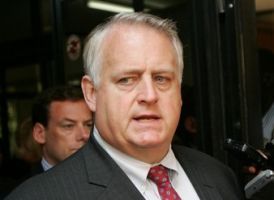Former US envoy endorses court move against Sudan’s Al-Bashir
By Daniel Van Oudenaren
March 4, 2009 (WASHINGTON) – Ambassador Richard Williamson, the US presidential envoy to Sudan who stepped down in January but whose special position has not been filled, endorsed the International Criminal Court (ICC) arrest warrant issued Wednesday against President Omer Al-Bashir.

Speaking from Chicago, the former diplomat and lawyer called the ICC move part of an “evolution of accountability” in restorative justice, comparing the case to earlier tribunals including the International Tribunal for the former Yugoslavia, the International Criminal Tribunal for Rwanda and the Special Court for Sierra Leone.
“I endorse the fact that there should be accountability for crimes,” he said in reference to the case. “It’s part of an evolutionary standard that there are certain crimes for which there needs to be accountability; and for societies to mend and move on, that accountability is important.”
Sudan has rejected the jurisdiction of the court and for now the ICC has no evident means of enforcing the warrant. Rather than engaging the court, the government has indicated it will retaliate against Sudanese and aid workers accused of collaborating with the Hague-based court, such as the Dutch agency Médecins Sans Frontières–Holland, which Sudan forced from Darfur today.
Nevertheless, Williamson viewed the issuance of the warrant as a big step. “Bottom line: One, there should be accountability. Two, President Bashir should engage the court and have an opportunity to defend himself and his record. I think it has been and continues to be a mistake that the regime has not engaged the International Criminal Court – I was among many who encouraged them to do that. And three, it obviously at least raises some questions about the legitimacy of the government President Bashir heads right now,” he said.
The former official, who has called the present situation in Darfur”genocide in slow motion,” commented on the majority opinion of two of the ICC justices, with one dissenting, that there was not enough evidence presented by the chief prosecutor to justify the genocide charge. “The whole question of genocide has been controversial ever since the first person of prominence called it genocide in the summer of 2004, Secretary Powell, followed a month later by President Bush up at the UN General Assembly. And because using the word ‘genocide’ or claiming a situation is ‘genocidal’ triggers various international commitments under the anti-genocide convention, there was a wariness of invoking that term. And I think that probably played a role in the court’s deliberations.”
DIPLOMACY
Williamson also downplayed recent suggestions, particularly from Libya, that many African countries could abandon their treaty commitment to the ICC due to their support for Al-Bashir. He pointed out that if Sudan and its allies adopt such a tactic to combat the court, it would do little to advance their case for an Article 16 suspension in the UN Security Council, since the US still holds a veto over the process as one of the permanent members of the council.
“If you’re raising that to encourage the US to somehow interfere with the ICC procedures, you probably should reflect on that since the United States is not a member of the ICC to be concerned about that,” he said. Williamson noted that he had raised the same point in discussions last summer with Ambassador Ramtane Lamamra, the AU Commissioner for the Peace and Security Council. That meeting occurred shortly before Williamson indicated that the US would veto an Article 16 measure regardless of how many countries supported it.
As to the US engagement with Sudan, Williamson urged the appointment of a new envoy, “somebody that President Obama and Secretary Clinton feel comfortable with and someone with knowledge of the situation and who probably can be pretty tough.”
Currently there is an interagency review for Sudan but no policy has been announced.
“My view is, there are a variety of reasons for why the opportunity for a diplomatic surge is ripe and that time is not on the side of those who want to see progress in Sudan. And so the more time that goes by without that diplomatic surge—and the US certainly has a prominent role to play in that—the more that opportunity is slipping away. So I hope they choose to act soon and vigorously,” he said.
Last December the former envoy made a public address advising the incoming Obama team to plan to “test the diplomatic openings that exist” while developing “actionable options including robust steps.”
(ST)
